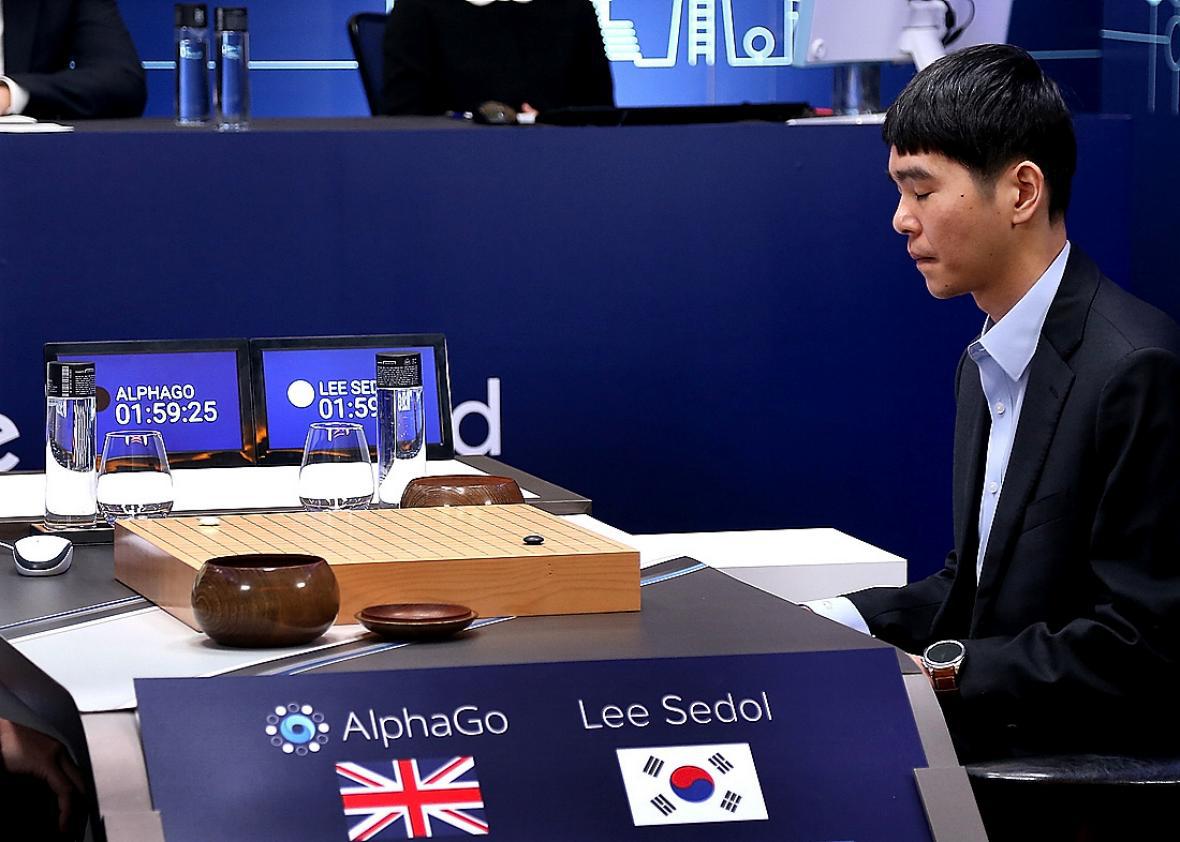Update, March 10, 10:35 a.m.: Make that, A.I. 2, human Go champion 0. Early Thursday morning Eastern time, Google’s AlphaGo software once again defeated 18-time world champion Lee Sedol in the second game of their five-game Go match in Seoul.
According to the Verge’s Sam Byford, reporting from the scene, the second game was “a gripping battle that saw Lee resign after hanging on in the final period of … overtime, which gave him fewer than 60 seconds to carry out each move.”
At least, human onlookers thought it was a gripping battle. To AlphaGo itself, however, it appears to have been something of a snoozefest. AlphaGo became confident of victory as early as halfway through the match, according to Demis Hassabis, head of Google’s DeepMind artificial intelligence division—at a time when the professional commentators couldn’t even tell who was ahead. Lee himself called it “a very clear loss on my part,” in a statement provided by Google.
“Yesterday, I was surprised, but today I am quite speechless,” Lee said. “If you look at the way the game was played, it was a very clear loss on my part. Yesterday I felt like AlphaGo played certain problematic positions, but today I felt that AlphaGo played a near perfect game. There was not a moment I felt like its moves were unreasonable.”
The next game starts Friday at 11 p.m. ET, and you can watch it live on YouTube. A third win would assure AlphaGo of victory in the five-game match and $1 million in prize money, which Google has said it will donate to charity.
Original post, March 9, 12:48 p.m.: In a victory that will join Deep Blue’s win over Garry Kasparov and Watson’s dominance of Brad Rutter and our friend Ken Jennings on Jeopardy!, a machine-learning algorithm created by Google has defeated legendary world champion Lee Sedol in a game of Go.
AlphaGo, a software program built by Google’s DeepMind artificial intelligence division, took the first game of the historic five-game match early Wednesday morning when Lee resigned after about three-and-a-half hours.
“I was very surprised,” Lee said after the game, according to the Verge’s Sam Byford, who is in Seoul, South Korea, to cover the match. “I didn’t expect to lose. [But] I didn’t think AlphaGo would play the game in such a perfect manner.” Here’s how the final board looked:
Lee added that he made some mistakes early on and believes he has a chance of winning the next game if he can improve his opening strategy. Observers, including DeepMind chief Demis Hassabis, agreed the match was competitive.
But he couldn’t hide his ecstasy at the result:
As impressive as AlphaGo’s fist-game victory is, however, it doesn’t mean that A.I. is anywhere close to matching humans in general intelligence. As I explained in January, Go is a constrained environment with perfectly defined rules and goals. Brilliant as AlphaGo is in that context, it’s a specialized tool designed to win a specific game. What remains unique about the human brain is not its ability to specialize but its versatility.
That said, the approach embodied by AlphaGo—known as deep neural nets—holds enormous promise in realms ranging from image recognition to self-driving cars. And I wouldn’t bet against it in games two through five of its match with Lee. Neither would Kasparov:

Photo by Kim Min-Hee-Pool/Getty Images
In fact, AlphaGo accomplished that feat in November, when it swept the European champion 5–0. Beating Lee, however, represents a much tougher test: He’s recognized as the greatest Go player of his generation and one of the best ever.
Previously in Slate:
